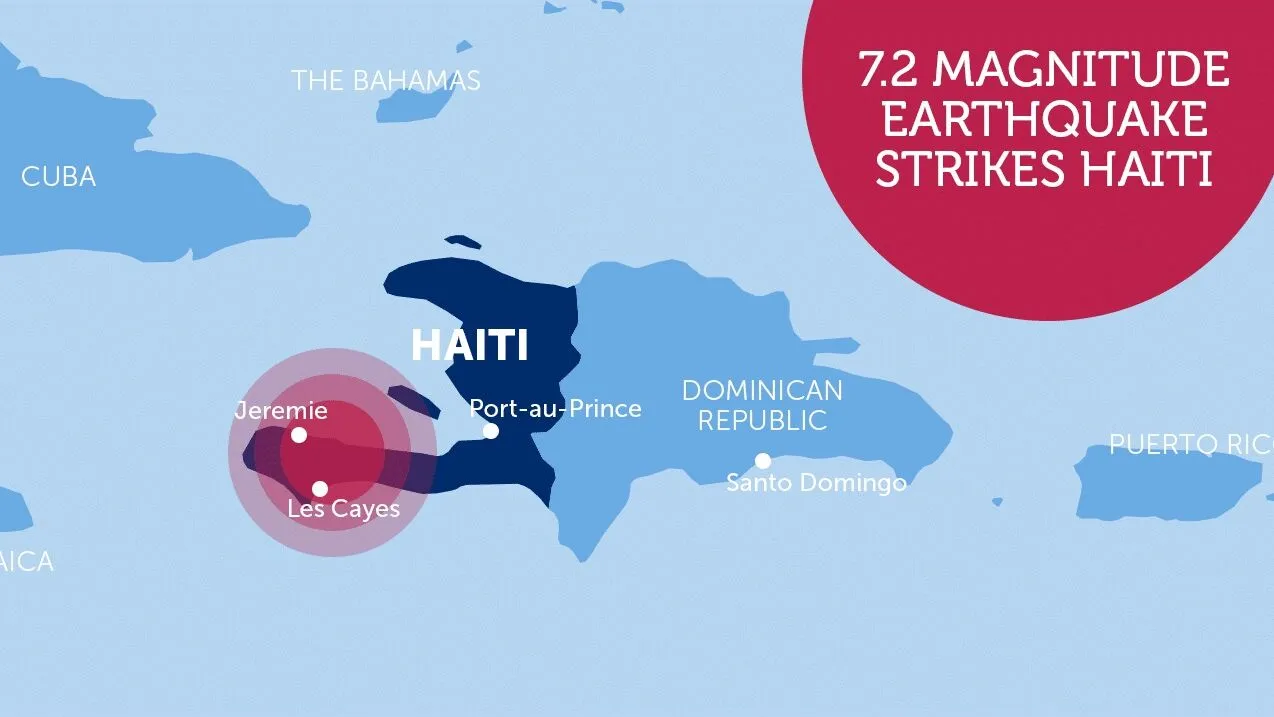Haiti Earthquake: How Project HOPE is Responding
Project HOPE has concluded the response in Haiti for the earthquake.

Project HOPE has concluded an active response on the earthquake in Haiti. To learn more about our active responses, please visit our Urgent Need page.
Project HOPE is on the ground providing patient care and delivering critical medical support in the aftermath of the 7.2-magnitude earthquake that struck Haiti on August 14. At least 650,000 people in Haiti are in need of humanitarian assistance in the departments of Sud, Grand’Anse, and Nippes. More than 2,000 people have died, over 12,000 are injured, and devastation is widespread near the city of Les Cayes, about 80 miles west of Port-au-Prince.
Hospitals in impacted areas have been overwhelmed by sudden needs, and many medical facilities have suffered major damage. Project HOPE’s Emergency Response Team is on the ground in the most affected areas, treating patients and delivering critical medicines and medical supplies, including bandages, sutures, and antibiotics, to health facilities in Les Cayes and the surrounding area.
Project HOPE has worked in Haiti for more than 35 years and has a long history of emergency response in the country, including the 2010 earthquake and Hurricane Matthew.
Read on to learn more about this crisis and how you can help.
Haiti Earthquake: What You Need To Know
- A 7.2-magnitude earthquake struck Haiti on August 14 near the city of Les Cayes
- At least 650,000 people are in need of humanitarian assistance
- More than 2,000 people have died, 12,000 are injured, and 137,000 homes have been damaged or destroyed
- Project HOPE is on the ground in Haiti treating patients and delivering critical medical support
Widespread Damage Reported Across Haiti
The scale of health, water, sanitation and hygiene, and shelter needs in Haiti’s Tiburon peninsula is immense. Estimates indicate that 650,000 people are in need of emergency humanitarian assistance in the departments of Sud, Grand‘Anse, and Nippes. More than 119,000 people in the region lack access to potable water, increasing the risk of water-borne diseases.
“This earthquake is yet another crisis — among many others — that Haiti is facing. We fear the worst as we think of the 2010 earthquake Haiti suffered,” says Tom Cotter, Director of Emergency Response and Preparedness at Project HOPE. “There are a lot of reasons to be concerned right now, especially as most Haitians have yet to be vaccinated and COVID-19 could now spread even faster as people flee and gather on displacement sites. Medical facilities and ambulance services were scarce even before the earthquake, with the majority of Haitians unable to afford medical services. Supporting local health care personnel and emergency first responders will be crucial to save as many lives as possible.”
The earthquake destroyed or damaged 137,000 homes, and several shelters in the region also sustained damage, leaving thousands of people homeless. Many people were sleeping outdoors or in makeshift tents as Tropical Depression Grace moved through the area causing flooding and landslides. Population displacement has raised the need for water, sanitation, and hygiene (WASH) services, with 119,000 people now lacking access to clean water.

The earthquake forced some hospitals and health clinics in the Les Cayes area to move patient care outside due to structural damage. Many health facilities have reported significant shortages of medicines and supplies, including antibiotics, surgical supplies, and rehabilitation supplies. The hospitals have been overwhelmed by local needs and have airlifted some patients to health facilities in Port-au-Prince. At least 32 health facilities have sustained damage and four were destroyed.
Reported injuries at health facilities continue to include injuries directly related to the earthquake, but basic health care and nutritional services needs are increasingly being requested of rural health facilities. Many health facilities lack adequate water, sanitation and hygiene (WASH) facilities, with just 60 percent of health facilities in Sud and 52 percent of health facilities in Grand’Anse having basic water services prior to the earthquake.



